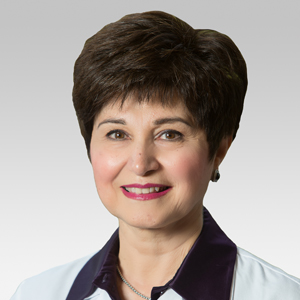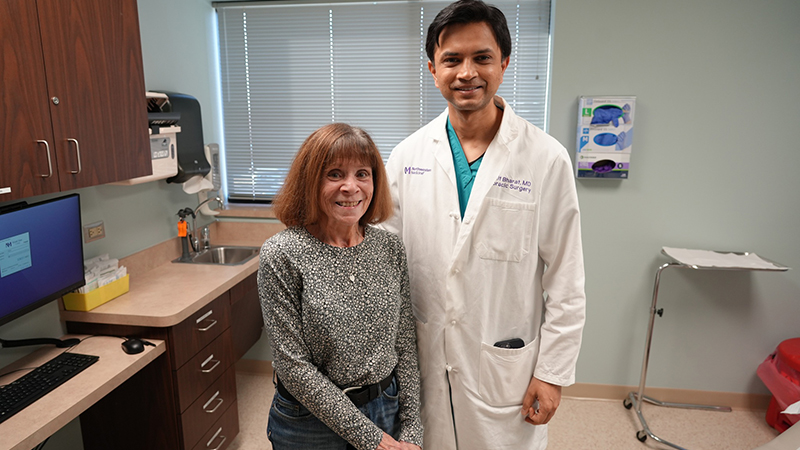Clinical Trials Provide More Options for Cancer Care
Discovering Better Ways to Treat Patients
Updated August 2023
Cancer is the uncontrolled growth of cells that can invade normal parts of the body and spread to other parts of the body. There are more than 150 types of cancer, and an estimated 2 million people in the United States will be diagnosed this year.
In order to better serve patients, Northwestern Medicine, Robert H. Lurie Comprehensive Cancer Center of Northwestern University and Northwestern University Feinberg School of Medicine use clinical trials to impact patients’ care and seek improved outcomes. Maha H. Hussain, MD, FACP, FASCO, a medical oncologist and clinical researcher at Northwestern Medicine and deputy director at Lurie Cancer Center, says, “Applied medicine is a combination of evidence, science and clinical experience. As leading experts, we are very involved in developing clinical trials and testing leading-edge treatments.”
The Purpose of Clinical Trials
The first controlled clinical trial on record was done by a physician, James Lind, in 1749. Although medicine has come a long way since then, the intent is still the same: Develop the best treatments for patients.
Robust research is what will conquer cancer.— Maha H. Hussain, MD
Northwestern Medicine is currently conducting hundreds of clinical trials for a wide range of conditions. The purpose of each trial is to answer a specific question to improve patient care. Ultimately, the goal is to discover more effective, less risky methods to treat patients, manage health conditions, impact patient outcomes, and enhance quality and quantity of life.
Dr. Hussain says that clinical trials for cancer are designed to address specific needs across different types of cancer and their stages, including situations where there aren’t any other effective treatment options.
Before creating a clinical trial, clinical scientists:
- Conduct an extensive review of the biology, earlier investigations and emerging data.
- Review the current standard treatment and its efficacy and impact.
- Evaluate past unsuccessful trials and assess why they failed.
- Investigate weaknesses and gaps in existing treatments for the disease.
“Our subspecialized, multidisciplinary teams meet to discuss gaps and unmet needs, collaborate with our scientists and develop clinical trials accordingly,” explains Dr. Hussain. “In addition to trials our investigators design, they have access to National Cancer Institute clinical trials and new medications. They also collaborate with other institutions, scientific entities and pharmaceutical companies to bring the best clinical trials to our patients.”
Weighing the Risks
The process for conducting clinical trials is extremely rigid and tightly regulated for patient safety by:
- The Institutional Review Board (IRB)
- The Lurie Cancer Center Data Safety and Monitoring Committee
- The U.S. Food and Drug Administration (FDA).
“Ultimately, our goal is to ensure safety of the patient and the integrity of the process and the data,” says Dr. Hussain.
As with any procedure or treatment, risk is an important factor to consider.
“Any intervention has risks, even routine procedures. Potential risks are explained and written down for the patient. There’s very close monitoring and, depending on severity, therapy might be adjusted or stopped if medically unsafe or ineffective,” says Dr. Hussain.
In certain trials, a placebo (a substance or treatment that does not have any active ingredients) or other treatment approach may be used as part of the clinical trial design. It may be used alone or in with standard therapy. This provides a control group in order to measure the effectiveness and safety of the active experimental treatment. The researchers tell participants if placebos are used in the particular trial, and the information is also provided in the IRB-approved consent form. However, to maintain integrity of the data, neither the treating physician nor the participants know if the participant is receiving the placebo or the active treatment.
Certain risks and side effects of some treatments are known, such as suppressing bone marrow function and potential hair loss with chemotherapy. However, the complete risk may not be entirely known especially for new medications. Regardless of the type of side effect, physicians and their teams closely monitor participants and have processes in place to ensure participants’ safety.
“The priority is to maximize the benefit versus risk ratio, and minimize side effects as much as possible,” explains Dr. Hussain. When the risk significantly outweighs the potential for benefit, it’s “unacceptable risk” and the trial will not move forward.
Taking the Next Step
After diagnosis of illness, Northwestern Medicine physicians discuss with patients next steps and the options for treatment, including standard of care and available clinical trials.
“I discuss in detail the disease setting, prognosis, standard-of-care treatment options, expectations and offer all options including clinical trials when they’re at a crossroad. I prioritize the options based on their potential value and opportunity based on totality of the available evidence, including if any life-prolonging standard-of-care options are available, clinical and scientific rational,” explains Dr. Hussain. “I always recommend having a family member or friend also be present and that the patient take some time to think about the choices and let us know preference. Seeking a second opinion is always an option a patient can consider, and I offer my patients that as well. Ultimately, our goal is to serve patients and make sure they’re very well informed so that they are comfortable with their decision.”
If you are interested in participating in a clinical trial, federal law requires most health insurance plans to cover associated standard-of-care costs. However, policies may vary so check with your health plan. To learn about clinical trials from around the world, visit clinicaltrials.gov.
Changing the Field of Medicine
“We all get into medicine for different reasons, but the most common, overarching cause is primarily to make a difference for people. My goal is to make life better, longer with the hope for cure, and to minimize physical and mental suffering for patients and their families,” says Dr. Hussain. “I view clinical trials as a way to achieve this goal in settings where we have no cures.”
Patients have a key role to play in this quest as well, and Dr. Hussain notes the generosity and thoughtfulness of individuals who participate in clinical trials. “Patients are very generous, and their first reaction many times is, ‘I want to help others,’” she says. “This is how we achieved the progress in conquering cancer, enhancing longevity and cure for millions of patients worldwide.”
Medical research has significantly improved health and reduced mortality.
- Research has led to life-changing and curative advances like the development of antibiotics to treat infectious diseases such as bacterial infections, tuberculosis and syphilis.
- Significant strides have been made in cancer care, such as treatment for testicular cancer, a curable disease even after it spreads.
- According to the Centers for Disease Control and Prevention (CDC), deaths from cancer are decreasing.
“We are curing more cancers and prolonging life in many cancers because of the research across the spectrum that led to discoveries of impactful procedures or treatments,” Dr. Hussain adds. “There are numerous stories, beginning with curing metastatic testicular cancer, as well as advanced breast, lung, prostate and colon cancers, and many types of blood cancers, in which the field has developed impactful, life-prolonging and potentially curative treatments.”
But research is a never-ending quest.
“We continue to be part of the process of discovery and research that leads to better therapies, and part of the scientific teams that are leading efforts to test better treatments with the goals of prolonging life, minimizing suffering and death, enhancing survivorship and ultimately curing cancer,” says Dr. Hussain. “Robust research is what will conquer cancer.”







